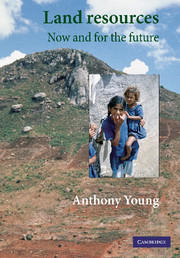Book contents
- Frontmatter
- Contents
- Preface
- Acknowledgements
- Note on acronyms and currency
- 1 Concern for land
- 2 Land resource issues
- 3 Resource survey and land evaluation
- 4 Competition for land
- 5 Working with farmers
- 6 Land use planning
- 7 Land degradation
- 8 Global issues: climatic change and biodiversity
- 9 Monitoring change: land resource indicators
- 10 Costing the earth: the economic value of land resources
- 11 Land management: caring for resources
- 12 Research and technology
- 13 Land, food, and people
- 14 Population, poverty, and conflict
- 15 Awareness, attitudes, and action
- Notes
- References
- Index
2 - Land resource issues
Published online by Cambridge University Press: 04 August 2010
- Frontmatter
- Contents
- Preface
- Acknowledgements
- Note on acronyms and currency
- 1 Concern for land
- 2 Land resource issues
- 3 Resource survey and land evaluation
- 4 Competition for land
- 5 Working with farmers
- 6 Land use planning
- 7 Land degradation
- 8 Global issues: climatic change and biodiversity
- 9 Monitoring change: land resource indicators
- 10 Costing the earth: the economic value of land resources
- 11 Land management: caring for resources
- 12 Research and technology
- 13 Land, food, and people
- 14 Population, poverty, and conflict
- 15 Awareness, attitudes, and action
- Notes
- References
- Index
Summary
Land resource issues are problems in land use planning and resource management, arising from the interactions between human society and the natural environment. This chapter identifies the key land resource issues for the ‘three worlds of the tropics’, the major agro-ecological zones: the humid tropics or rain forest zone, the subhumid tropics or savannas, and the dry lands, semi-arid and desert. Cutting across these climatic regions are two distinctive environments: steeplands and alluvial lowlands. Land resource issues are related to the essential nature of sustainable land use: combining the efficient use of resources to meet present needs with their conservation for the future. Many issues are concerned with the avoidance of land degradation.
The concept of land resource issues brings together two of the principal aspects of land use planning and management, making the best use of resources, and conserving them for the future – in short, sustainable use of the land resources. Land resource issues affect the state or condition of resources, but are not problems of the physical environment alone. They arise from the interactions between resources offered by the physical environment, the needs of land users, competition for land, and methods of land management.
Many other problems and policy issues have major impacts on land, but are not land resource issues as such. Examples are marketing facilities, supplies of agricultural inputs, veterinary services, and pricing policies.
- Type
- Chapter
- Information
- Land ResourcesNow and for the Future, pp. 12 - 24Publisher: Cambridge University PressPrint publication year: 1998



